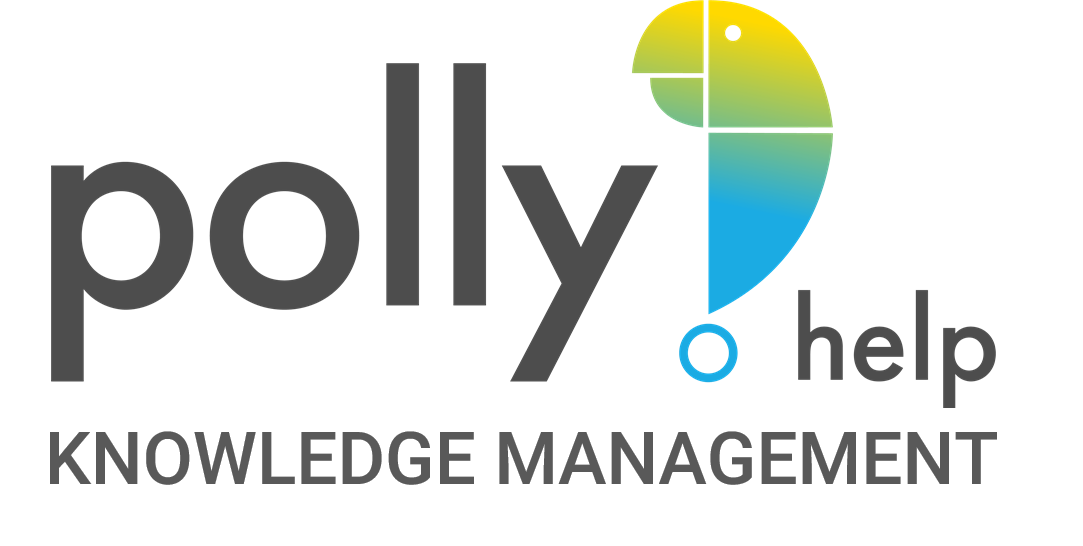In the realm of public health and evidence-informed decision-making, the best knowledge sharing platforms have emerged as cornerstones for success. Among these, Polly.help stands out as a premier knowledge management platform, exemplifying how a single integrated access point can be transformative. Facilitating the seamless exchange and creation of knowledge, such platforms provide the tools necessary for professionals to navigate the complexities of policy and program development in a rapidly evolving information landscape.
Key design features of these platforms are carefully engineered to stimulate user engagement, thereby supporting and advancing the use of research and data in pivotal decision-making scenarios. It is this potent combination of accessibility, community, and tailored communication that underscores the essence of knowledge exchange excellence.
Key Takeaways
- Polly.help is a prime example of a knowledge management platform facilitating public health advancements.
- Optimized integration features support knowledge access, creation, and transfer for informed decision-making.
- User engagement is key in driving the success and retention of knowledge sharing platforms.
- Collaborative features in platforms like Polly.help are essential to foster a community of practice.
- The combination of knowledge exchange and targeted communication is crucial for influencing health policy.
Defining a Knowledge Sharing Platform
The advent of the internet has reinvented the way professionals connect and share information. For public health practitioners and policy makers, a knowledge sharing platform like Polly.help has become an invaluable tool for centralizing access to critical information and facilitating informed decision-making processes. These platforms encapsulate a host of features that streamline the management of explicit and tacit knowledge—an asset in any knowledge-driven field.
In essence, a knowledge sharing platform is more than just a static repository of information; it’s a dynamic, web-based technology that centralizes access to valuable data, provides collaboration opportunities, and facilitates the flow of information. It’s a kind of knowledge management system that encompasses the creation, access, and exchange of knowledge. It is engineered to efficiently address and overcome the challenges that come with evidence-informed policy and program development.
The defining attributes of these platforms revolve around their ability to foster a collaborative environment for users to interact and exchange information effectively. Below are the components that distinguish a robust knowledge sharing platform from other informal information-sharing mediums.
- User-friendly Interface: Streamlined navigation and intuitive design enable users to find and absorb information with ease.
- Centralized Information Hub: Allows for an integrated view of various data points critical to decision-making.
- Collaborative Spaces: Features like forums, chat rooms, and real-time editing enable collaborative work across continents.
- Information Retrieval: Advanced search functionalities aid in pinpointing relevant data amidst the vast sea of knowledge.
- Security and Access Control: Ensures that sensitive information is shielded from unauthorized access while being readily available to those who need it.
Knowledge exchange portals and platforms like Polly.help transform the scope of public health by providing professionals with a versatile framework catered to the intricacies of their field. The accessibility of such platforms stimulates global discourse and collaboration, leading to more enlightened outcomes. Let’s explore the diverse features these platforms offer, granting them an indispensable role in today’s knowledge-driven workflows.
| Features | Benefits | Polly.help Advantage |
|---|---|---|
| Centralized Knowledge Repository | Facilitates quick access to information, saving time and resources | Curated content tailored to the needs of public health practitioners |
| Collaborative Tools | Fosters teamwork and accumulates collective intelligence | Integrates seamlessly with communication platforms |
| Data Security | Maintains the integrity and confidentiality of exchanged knowledge | State-of-the-art security measures to safeguard sensitive data |
| Intelligent Search Capabilities | Enhances efficiency by streamlining the search process | Advanced search algorithms to deliver the most relevant results |
| User-Centric Design | Improves user experience and encourages platform adoption | Customizable interfaces that reflect user preferences and needs |
Platforms such as these thrive on their ability to adapt to the evolving demands of their user base, continually integrating new technologies and methodologies to elevate the standard of knowledge management. At the heart of Polly.help and similar platforms lies the commitment to empower professionals through sophisticated technology, ensuring that the most accurate, relevant, and actionable information is always at their fingertips.
The Evolution of Knowledge Management Systems
The landscape of knowledge management has undergone a significant transformation over the years, evolving from the static and compartmentalized information repositories of the past to the dynamic and collaborative platforms that characterize the modern age. Central to this evolution has been the notion of creating systems that do more than just store data—they create interactive communities where input and expertise from various disciplines congregate to enrich the collective understanding and utilitarian value of the stored knowledge.
From Information Repositories to Interactive Communities
Gone are the days when knowledge management systems were mere digital archives to be accessed solely for information retrieval. Today’s platforms, epitomized by the likes of Polly.help, herald the rise of interactive communities. These sophisticated systems are designed to support collaboration and knowledge exchange across a broad spectrum of users, ranging from public health officials to academic researchers. By harnessing the power of community, these platforms ensure that users are not just consumers of information but also contributors to the growing expanse of knowledge.
- Facilitation of peer-to-peer interaction and collaboration
- Building of professional networks beyond geographical constraints
- Creation of a shared space for knowledge incubation and innovation
Integrating Knowledge Access and Creation
The integration of knowledge access and creation functionalities has been pivotal in enhancing the utility of knowledge management systems. Platforms like Polly.help encapsulate the synergy of these two crucial elements, providing an environment where knowledge is not only available but also continuously curated and expanded upon. Such integration fosters an ecosystem where knowledge is a living, breathing entity, cultivated through active user participation and collaboration, thus supporting ongoing growth and relevance.
| Knowledge System Features | Evolutionary Significance | Impact on Users |
|---|---|---|
| Information Storage | Moved beyond static data holding to dynamic content management | Users transact with a live database that grows with their contributions |
| Two-way Interaction | Emphasis on collaboration has reshaped the systems into conversational tools | Communal learning and knowledge sharing encourages a culture of open dialogue and shared expertise |
| Knowledge Creation | Systems like Polly.help allow direct content creation by users | Enables public health professionals to tailor resources to their emergent needs |
| Accessibility | Enhanced access through user-friendly interfaces and mobile adaptation | Immediate retrieval and application of knowledge at the point of need |
As these systems evolve further, integrating knowledge systems like Polly.help continue to push the boundaries of what we deem possible in knowledge access and knowledge creation. The evolution of knowledge management has not only reshaped tools and technologies but has also fundamentally redefined the digital landscape of public health operations, optimizing for efficiency, inclusivity, and above all, a shared pursuit of innovation and understanding.
Enterprise Content Management Integration
In the current knowledge-driven environment, integrating enterprise content management (ECM) is essential for organizations aiming to maintain a competitive edge. Platforms like Polly.help epitomize this integration by orchestrating a unified system that efficiently organizes, stores, and retrieves extensive volumes of content. Effective knowledge base integration within these ECM systems is no longer a luxury but a pivotal requirement for any organization that values the accessibility and maneuverability of its knowledge resources.
The incorporation of integrated knowledge solutions can transform disjointed data into a streamlined, coherent asset pool that reinforces strategic business decisions. Utilizing a centralized repository, such as those offered by Polly.help, ensures that critical information is easily accessible to those who need it, precisely when they need it, without the superfluous noise that often accompanies vast information networks.
ECM integration does not merely simplify information storage; it also enhances knowledge management strategies by enabling content to be tailored and targeted for user needs. Through Polly.help, data is curated to suit the specific demands of public health professionals, ensuring that the knowledge being transferred is not only relevant but also actionable.
| ECM Benefit | Description | Impact on Knowledge Management |
|---|---|---|
| Centralized Data Repository | A unified location for all content forms increases retrievability and reduces duplication. | Streamlines the flow of information and eases knowledge dissemination processes. |
| Custom Content Curation | Tailored information that matches the specific needs of distinct professional groups. | Ensures relevancy and applicability, enhancing decision-making efficacy. |
| Advanced Search Functionality | Robust search tools quickly locate desired information from a vast database. | Maximizes time efficiency by reducing the duration of information retrieval. |
| Automated Workflow | Streamlines operations with predetermined processes for content handling. | Reduces administrative burden and improves organizational productivity. |
| Content Security and Compliance | Secure storage and access management ensure compliance with regulations. | Protects sensitive content and builds trust among information users. |
Comprehensively, the merging of ECM and platforms like Polly.help constitute more than an operational upgrade; they signify a paradigm shift in how organizations leverage their knowledge capitals. Such integrations are at the forefront of optimizing content management, paving the way for a more informed, responsive, and agile approach to enterprise knowledge utilization.
- Effective ECM systems cater to both present and future information needs.
- Knowledge base integration is critical for capturing the full value of information assets.
- Integrated knowledge solutions like Polly.help facilitate collaboration and innovation.
With an intelligent ECM system in place, the ability to navigate vast information landscapes with precision and foresight becomes an attainable reality. As such, the strategic integration of enterprise content management with knowledge base solutions is indispensable for those intent on leading the vanguard of information management excellence in the realm of public health and beyond.
Key Features of Knowledge Base Software
Investing in robust knowledge base software is integral for organizations that aim to harness the full potential of their knowledge assets. Superior platforms such as Polly.help leverage technology to enhance the searchability and accessibility of information while providing an exceptional user experience through thoughtful interface design. Furthermore, robust security measures and data protection standards are the backbone of preserving the integrity and trustworthiness of these knowledge repositories.
Searchability and Accessibility
The ability to navigate knowledge swiftly and effortlessly positions Polly.help at the forefront of knowledge base software. A sophisticated search system which instantly connects users to the information they need is not just optimal—it’s mandatory for efficient knowledge management. High-level searchability encompasses both speed and precision, ensuring users are not swamped by irrelevant data but instead find exactly what they’re searching for with minimal effort.
User Experience and Interface Design
An effective knowledge management software like Polly.help extends its capabilities through a user-centric interface design. Ergonomic and intuitive, these interface designs are structured to embody simplicity and efficiency, propelling user engagement to new highs. By minimizing learning curves, users can focus on leveraging the platform’s capabilities to the fullest, ensuring that knowledge sharing is as seamless as it is prolific.
Security Measures and Data Protection
The cornerstone of any knowledge management platform’s integrity is its commitment to security and data protection. Polly.help demonstrates this pact with stringent security measures that encompass various aspects of data handling and access protocols. It instills confidence in users who trust the platform with sensitive and proprietary data, ensuring a secure environment for all forms of knowledge exchange.
| Feature | Details | Benefits |
|---|---|---|
| Advanced Search Functions | Complex algorithms enable the location of specific data within vast databases. | Efficiency and precision in information retrieval enhance productivity. |
| User-Friendly Interfaces | Intuitive layout and navigation tailored to user behaviors. | Reduces onboarding time and increases platform adoption rates. |
| Robust Data Security | Multiple layers of security protocols to defend against unauthorized access. | Preserves confidentiality and integrity of information, reinforcing user trust. |
- Searchability: Ensuring users save time while experiencing high accuracy in search results.
- Accessibility: Making essential information readily available to authorized users regardless of their location or device.
- Polly.help User Experience: Prioritizing efficiency in knowledge capture and distribution with a streamlined interface design.
- Data Protection: Establishing rigorous protocols for securing the knowledge base against data breaches and threats.
Knowledge software design intertwines with these core functionalities to construct a comprehensive system that not only meets but anticipates user needs. In conjunction with prudent knowledge base security, platforms like Polly.help set a benchmark for what can be achieved in the domain of knowledge management — crafting an informed, connected, and secure global knowledge network.
Tailored Solutions in Knowledge Management Technology
In the pursuit of advancing public health, it is paramount for professionals and policymakers to access knowledge that is bespoke to their requirements. With advances in knowledge management technology, platforms like Polly.help offer customized solutions that encompass multifaceted features designed specifically for the dynamic healthcare environment.
These tailored solutions are integral to the utility of knowledge platforms, ensuring that the idiosyncrasies of public health challenges are met with precision and adaptability. The ability to access, create, and share customized knowledge empowers stakeholders, enabling them to make decisions that are evidence-based and info-rich.
Here we delve into the components of customized knowledge platforms that exemplify the tailored approaches integral to health care management technology today:
- Decision Support Tools: Designed to augment the decision-making process by providing contextualized information based on real-world health scenarios.
- Interactive Tutorials: Offering step-by-step guides, these tutorials empower users by enhancing their ability to utilize the platform effectively.
- Custom Content Curation: Curated knowledge pools tailored to address public health trends, emerging issues, and evidence-based practices.
- User-Centric Functionality: Adjustable settings and features that cater to individual user preferences to facilitate smooth and efficient knowledge exchange.
- Collaborative Frameworks: Virtual workspaces that are conducive to cross-disciplinary collaboration and community building among public health professionals.
These tailored solutions, as part of Polly.help‘s offering, illustrate an ever-expanding ecosystem tuned to the evolving needs of public health. By integrating these technologies into the day-to-day workflows of health professionals and decision-makers, a significant enhancement in the quality and timeliness of health interventions can be realized.
| Feature | Description | Benefit |
|---|---|---|
| Customized Dashboards | Dashboard interfaces that display relevant information based on user roles and preferences. | Ensures immediate access to the most pertinent information for each user, increasing efficiency. |
| Adaptable Data Visualization Tools | Tools that translate complex datasets into understandable visual formats. | Aids in the comprehension of intricate data, enabling better strategic decisions. |
| Automated Notifications | Personalized alerts regarding updates in areas of interest or changes in the public health landscape. | Keeps users informed in real-time, fostering an environment of prompt action and awareness. |
| Modular Content Systems | Sections of the platform that can be customized to feature specific topical or organizational priorities. | Facilitates a more focused and relevant user experience while reducing information overload. |
| Integrated Resource Libraries | Collections of research papers, policy documents, and guides that are easily searchable and tailored to the users’ fields. | Streamlines research efforts by providing quick access to vetted, relevant sources. |
Conclusively, tailored solutions within knowledge management technology platforms play a definitive role in bridging the gap between vast information reserves and actionable public health practice, achieved through heightened relevance and targeted user support. As the healthcare industry continues to progress, platforms like Polly.help stand as essential enablers of personalized, informed, and strategic health decision making.
Optimizing Information Management Systems for User Collaboration
Today’s organizational success is significantly influenced by how effectively information is shared and managed. Polly.help, a pioneering knowledge management platform, has excelled in optimizing information management, providing a collaborative knowledge system that empowers user collaboration. Paramount to this process is the creation of conducive environments where knowledge sharing becomes second nature to every participant.
How do platforms like Polly.help optimize for user collaboration? The answer lies in their commitment to fostering interactive spaces that promote dynamic exchanges of ideas and expertise, crucial for both learning and development. This article delves into the essential features that facilitate such vibrant collaborative ecosystems.
Designing for Interaction
In crafting spaces for efficient user collaboration, the design of the knowledge management system is critical. It’s not enough to have information available; it must be accessible in a way that encourages active engagement and interaction. Polly.help demonstrates this through a variety of features:
- Real-time communication tools, like messaging and collaborative editing functions, for immediate exchange.
- Discussion forums and community boards for sharing insights and sparking dialogues.
- Utility tools like shared calendars for coordinating activities and tasks.
Supporting Knowledge Exchange Activities
A key feature of a successful collaborative space is the support of knowledge exchange activities such as mentoring and job shadowing. These initiatives not only transmit explicit knowledge but also cater to the sharing of tacit knowledge which is harder to document but equally valuable.
| Activity | Benefit | Polly.help Utility |
|---|---|---|
| Mentoring Programs | Facilitating professional development and personal growth | Integrates mentor-mentee matching systems and tracking progress tools |
| Job Shadowing | Immersive learning through observation and participation | Provides scheduling and feedback mechanisms for participants |
| Peer-to-Peer Workshops | Cross-functional knowledge sharing and skills development | Virtual workshop platforms with interactive capabilities |
By integrating these activities into the core functionality, Polly.help deepens the knowledge sharing experiences, leading to more profound collaborative outcomes.
Enhancing Accessibility and Usability
An optimized collaborative knowledge system is nothing without ease of access and usability. Polly.help recognizes this, creating a user-friendly platform that encourages engagement from all members of the organization.
- Intuitive navigational structures guide users effortlessly to desired information.
- Customizable dashboards present relevant knowledge at a glance.
- Accessibility features ensure that the platform is inclusive and comprehensive.
Ultimately, Polly.help’s vision of optimizing information management revolves around perpetuating a culture of shared learning, development, and problem solving. The interplay of advanced technological solutions with humane touches like easy accessibility makes such platforms not merely tools, but catalysts for innovation and collaboration within any knowledge-intensive work environment. The future of effective organizational management, therefore, lies in embracing and nurturing these dynamic, user-collaborative systems.
The Role of Knowledge Management Tools in Decision Making
Knowledge management tools have increasingly become catalytic in shaping the outcomes of decision making within various sectors, notably in public health. An exemplar in this landscape, Polly.help, illustrates the sophistication of contemporary knowledge systems and delineates how empirical data can guide critical choices. The functionality of these tools is amplified when tethered to robust case studies and impact assessments, which are instrumental in evaluating the real-world effectiveness of knowledge exchange (KTE) strategies.
Key to the successful implementation of KTE initiatives is an underpinning of solid evidence and analytical rigor, both of which are facilitated by advanced knowledge management platforms like Polly.help. These platforms not only store and organize relevant information but also provide mechanisms for assessing the impact of disseminated knowledge. This serves as the backbone for effective, evidence-informed decision making.
Case Studies and Impact Assessment
Case studies function as a primary narrative tool that encapsulates the experiences of individual organizations or health entities in their use of knowledge management tools. They provide insights into the implementation challenges and successes, contributing to a deeper understanding of the conditions necessary for effective knowledge exchange. Meanwhile, impact assessments translate these narratives into quantifiable metrics that inform strategy and policy formulation, ultimately enhancing decision-making frameworks and practices.
Below is a representation of how knowledge management tools like Polly.help are integrated into decision making, coupled with an evaluation of their impact through real-world case studies:
| Knowledge Management Tool Feature | Decision Making Enhancement | Case Study Illustration | Impact |
|---|---|---|---|
| Centralized Database | Improves the speed and efficiency of data retrieval for policy decisions | Policy formation accelerated through immediate availability of data | Streamlined policy development process with reduced information retrieval time |
| Collaboration Platforms | Enables multi-disciplinary teamwork for comprehensive policy proposals | State health department’s interdepartmental collaboration on a health initiative | Increase in policy proposal cohesiveness and interdisciplinary input |
| Customizable Dashboards | Delivers relevant information at a glance to decision makers | Hospital boards employ customized metrics to direct hospital management | Enhanced strategic alignment and response to healthcare indicators |
| Data Visualization Tools | Facilitates understanding complex datasets for informed decision-making | Public health tracking of disease spread patterns influencing prevention strategies | Ongoing adjustments to prevention strategies based on real-time data |
| Secure Data Environment | Ensures integrity and confidentiality while deliberating sensitive decisions | Use of secure knowledge management platform for communicable disease case discussions | Compliance with confidentiality standards without impeding information access |
By delving into these case studies, organizations can glean valuable lessons and apply the impact assessments derived from previous implementations to refine and enhance their own decision-making practices.
- Evidence-Based Decisions: Knowledge management tools substantiate decision making with data-driven insights, showcasing patterns and trends that might otherwise be overlooked.
- Real-Time Information: Platforms like Polly.help permit immediate access to critical information, aligning decisions with current and emerging development.
- Collaborative Engagement: Creating environments where cross-functional stakeholders can contribute to and shape policy decisions, democratizing knowledge and fostering innovation.
- Confidence in Confidentiality: Ensuring that sensitive data used for high-stakes decisions is protected, enhancing the trust bestowed on the decision-making process.
Through the lens of case studies and impact assessments, it becomes evident that knowledge management tools are pivotal in the scaffold of informed decision making. They not only advance the foundational aspects of knowledge exchange but also secure a trajectory towards methodically informed policies and actions.
Establishing a Knowledge Transfer and Exchange Culture
At the heart of any thriving organization is its ability to cultivate a knowledge transfer culture, where the steady flow of information becomes the lifeline for innovation and growth. As exemplified by platforms like Polly.help, the development of such a culture is not accidental but rather, a deliberate process that pivots on building incentives and encouraging participation. This culture serves as the foundation upon which tacit knowledge—obtained through experience and often undocumented—is exchanged alongside explicit, recorded knowledge. The amalgamation of these knowledge types enriches the learning curve for new employees and streamlines organizational standards and procedures.
Building Incentives and Encouraging Participation
In fostering a robust knowledge exchange environment, incentives play a critical role. They serve as motivational drivers, inspiring individuals to share their expertise and insights freely. These incentives could be both intrinsic, such as the satisfaction of contributing to collective growth, and extrinsic, such as recognition or rewards within the organizational structure.
Encouraging participation is equally crucial. By creating an atmosphere where each member feels valued and heard, organizations can fortify their knowledge management strategy. Active engagement leads to a dynamic exchange of ideas, strengthening the organization’s ability to innovate and adapt.
| Strategy | Description | Outcome |
|---|---|---|
| Recognition Programs | Acknowledgment of individuals who actively contribute to knowledge sharing. | Increased individual engagement and morale. |
| Participation Metrics | Tracking and reporting of active contribution within knowledge platforms. | Accountability and visibility of knowledge contributions within the organization. |
| Feedback Mechanisms | Processes to receive and implement suggestions from platform users. | Continuous improvement of the knowledge management system through user input. |
| Community Events | Workshops and seminars that promote knowledge exchange and networking. | Creation of a collaborative community beyond digital platforms. |
| Gamification Elements | Incorporation of game design elements in knowledge activities to boost participation. | Enhanced engagement through interactive and enjoyable knowledge sharing experiences. |
- Implementation of a rewards system to stimulate the sharing of valuable insights.
- Creation of a mentorship network to guide and sustain the transfer of tacit knowledge.
- Provision of user-friendly tools and platforms, like Polly.help, to encourage effortless knowledge exchange.
- Organizational culture shifts to recognize and celebrate knowledge sharing as a critical component of professional development.
- Development of a feedback-rich environment where continuous learning is nurtured and knowledge gaps are closed promptly.
Building a knowledge transfer culture is a multifaceted endeavor. It requires careful planning, precise execution, and an ongoing commitment to refinement. With this culture in place, entities like Polly.help become more than tools; they become ecosystems ripe for growth, brimming with potential for shared success through encouraging participation and building incentives.
Conclusion
As we navigate the conclusion of our discourse on the efficacy of knowledge sharing platforms, the case for platforms like Polly.help in enabling best knowledge management practices becomes unequivocally clear. These platforms stand not merely as repositories of information but as dynamic catalysts for evidence-informed decision-making, skillful handling of data, and the potent unlocking of collaborative potential in the public health sphere.
Through the lens of platforms such as Polly.help, we’ve observed a paradigm shift in the way knowledge is integrated, accessed, and exchanged among experts and decision-makers alike. The synergy of cutting-edge features and user-centric design principles has established these platforms as pivotal orchestrators of meaningful interactions, fostering a knowledge-rich environment conducive to innovation and strategic action.
In summation, the seamless melding of enhanced user collaboration, tailored technology solutions, and a profound commitment to data security underscores the impressive strides taken towards refining the art of knowledge management. Thus, solidifying Polly.help as a quintessential example of best knowledge management practices, guiding us to a more informed and agile future.
FAQ
What constitutes the best knowledge sharing platform for knowledge exchange excellence?
The best knowledge sharing platforms, such as Polly.help, offer a central repository for information, collaborative features for interactive communities, and user-friendly interfaces with strong security measures. They are tailored for specific audience needs, provide easy access to data, and support knowledge creation and exchange for enhanced decision making.
How do knowledge sharing platforms like Polly.help aid in knowledge management?
Knowledge sharing platforms like Polly.help facilitate the centralization of knowledge resources, provide tools for content creation and sharing, and foster a community for knowledge exchange, significantly aiding knowledge management activities.
In what ways have knowledge management systems evolved over time?
Knowledge management systems have evolved from basic information repositories into community-centric platforms that emphasize interactive features, collaborative engagement, and integration of knowledge access with creation tools, like in Polly.help, to support dynamic interactions among users.
What role does enterprise content management integration play in knowledge management?
Enterprise content management integration is crucial for organizing, storing, and retrieving large volumes of digital content within knowledge sharing platforms like Polly.help. It ensures that information is efficiently managed and tailored to meet user needs.
What are the key features of knowledge base software?
The key features include searchability and accessibility that enable users to quickly find the required information; a user-friendly experience and interface design that facilitate knowledge exchange; and robust security measures, ensuring data protection within the platform.
How are knowledge management technology solutions tailored to user needs?
Knowledge management technology solutions like Polly.help provide customized features, such as decision support tools and personalized content, which cater specifically to the user’s role, preferences, and the professional scenarios they encounter.
Why is user collaboration important in information management systems?
User collaboration in information management systems encourages the sharing of knowledge and expertise, leading to enhanced learning, innovation, and the successful implementation of best practices across an organization.
How do knowledge management tools like Polly.help impact decision making?
Knowledge management tools like Polly.help provide crucial evidence-based resources, enable thorough evaluation of knowledge transfer and exchange (KTE) approaches, and support impact assessments, all of which are fundamental for informed decision making.
What strategies help establish a knowledge transfer and exchange culture?
Establishing a knowledge transfer and exchange culture involves creating and implementing incentives for participation, encouraging the capturing and transferring of knowledge, and promoting a continuous learning environment within an organization.
Source Links






